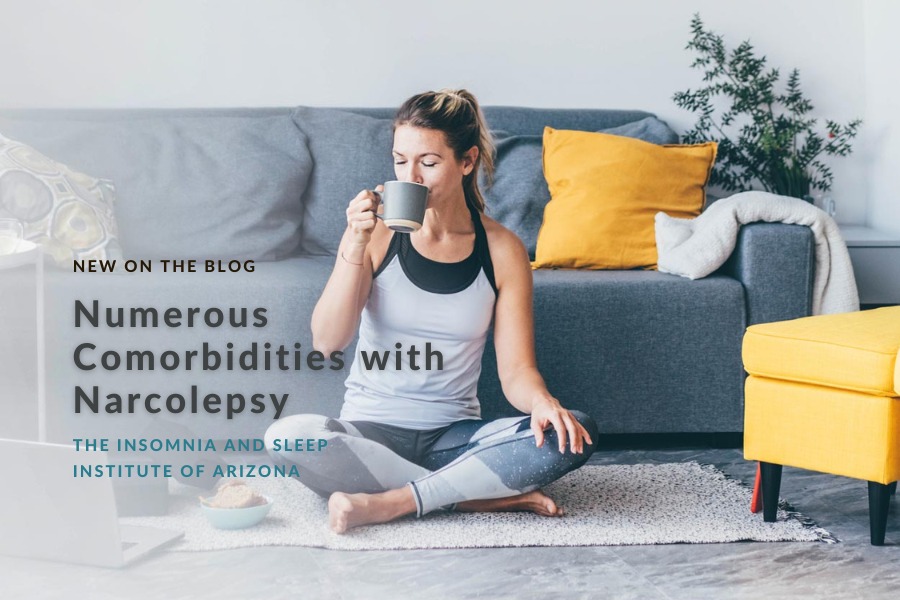Every type of sleep disturbance comes with co-morbidities, which is why we treat and help manage every sleep disorder at The Insomnia and Sleep Institute of Arizona. When it comes to narcolepsy, common comorbidities include other sleep issues as well as psychiatric, cardiovascular, and cardiometabolic conditions. According to recent research, the prevalence of these comorbidities can be found both at the initial diagnosis and at follow-up appointments years later. It is theorized that hypocretin (AKA orexin) dysfunction in those with narcolepsy may in part explain the higher comorbidity risks.
Some of the most common cardiovascular/cardiometabolic conditions include diabetes, hypertension, obesity, and hypercholesterolemia. These conditions have been found much more often in those with narcolepsy compared to control groups in various studies. One such interview study that included 320 people with narcolepsy—alongside 1,464 control participants in the same age range, found that those with narcolepsy were twice as likely to develop heart disease. The researchers say, “By an average age of 38 (mean age during study), an increased incidence of cardiovascular comorbidities has been observed among patients with narcolepsy compared with matched non-narcolepsy controls.”
What is Narcolepsy?
Many sleep disorders go undiagnosed or mis-diagnosed. Narcolepsy is a kind of sleep disorder that is vastly misinterpreted by the media. It makes people drowsy during the day, and it can be difficult for some patients to stay awake for long stretches of time. In some cases, patients can fall asleep quickly which can, understandably, get in the way of daily life. Narcolepsy can also cause sudden muscle tone loss, which is called cataplexy. Strong emotions, particularly laughter, can be a trigger.
There are two types of narcolepsy: types 1 and 2. Those with type 1 have cataplexy while most people with type 2 do not. Narcolepsy is a chronic condition with no cure, but sleep experts can help manage the symptoms. Management typically includes changes to lifestyle and medications. It’s important to have a strong support system, both personally and professionally, in order to live a full life with narcolepsy and decrease co-morbidities.
Do You Have Narcolepsy?
Sleep disorders like narcolepsy can take years to correctly diagnose because general physicians usually aren’t well-informed on the holistic symptoms of sleep disorders. In many cases, you need a referral to see a sleep doctor—but that isn’t the case with our clinic. You can schedule a consultation with a sleep expert at The Insomnia and Sleep Institute without any type of referral. Although drowsiness during the day is the most common symptom (which can be caused by numerous other factors), there are other, subtler signs that you or your child may have narcolepsy. It’s important to point out that the media portrayal of narcolepsy—quickly falling asleep on the spot numerous times for laughs—is relatively rare.
Instead, those with narcolepsy may also have sleep paralysis. When you’re experiencing sleep paralysis, you feel fully awake but cannot move or talk. These episodes can be scary, but are fortunately usually brief. They last just a few seconds or minutes. Some people are completely aware of (and remember) this happening while others do not. Hallucinations can also be a sign of narcolepsy. These hallucinations can occur with or without sleep paralysis and are called hypnagogic hallucinations. They can be common when you’re falling asleep or waking up, and may be frightening.
Shifts in rapid eye movement (REM) is also a sign of narcolepsy. This can only be gauged during a sleep study. REM is when dreaming mostly occurs, and most people enter REM 60 – 90 minutes after falling asleep. However, those with narcolepsy may move into REM too quickly, usually within 15 minutes of sleep. Finally, it is also very common for sleep disorders to have fellow sleep disorder co-morbidities. Those with narcolepsy may be more prone to having obstructive sleep apnea (OSA) and/or insomnia, to name just a couple.
If you suspect you have a sleep disorder, the sooner you get help, the better. Contact The Insomnia and Sleep Institute today to schedule a consultation with a sleep expert who can diagnose and kick-start testing and treatment. Call the office during business hours or, for the fastest reply, complete the online contact form now.





